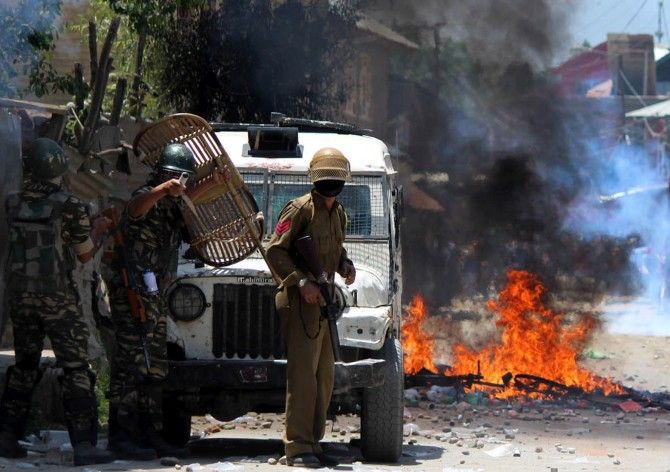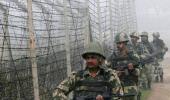'China's growing nexus with Pakistan and the two countries' unresolved territorial disputes with India continue to pose a formidable national security threat to India,' says Brigadier Gurmeet Kanwal (retd).

IMAGE: Soldiers at an encounter with Lashkar-e-Tayiba terrorists in Kashmir, June 16, 2017.
The soldiers were simultaneously battling stone pelters trying to distract the army and let the terrorists escape.
Photograph: Umar Ganie for Rediff.com
The polycentric new world order, which was gradually emerging since the end of the Cold War, has begun to fray at the edges.
The primary causes for this condition are the growing friction among the major powers, the triumphant rise of ultra-right wing political parties, dilution in the forces of globalisation and free market economies and the international community's inability to comprehensively defeat the forces of radical extremism.
North Korea's continuing nuclear warhead and ballistic missile tests in 2017 -- in flagrant violation of United Nations Security Council resolutions -- and US President Donald J Trump's threat to unleash 'fire and fury' like the world has never seen, have brought the Korean peninsula to the brink of war.
Though the probability of nuclear exchanges is low, the possibility of conventional conflict cannot be wished away.
In West Asia, while the progress made in liberating ISIS-controlled areas in Iraq and Syria has forced the Islamic caliphate to retreat geographically, its virulent ideology continues to flourish unabated.
In fact, a cyber caliphate is emerging gradually. It is potentially more dangerous than its geographical counterpart due to the ability of a handful of the faithful to radicalise large sections of vulnerable youth using the Internet.
In Southern Asia, the tenuous security environment in Afghanistan and along the Af-Pak border is the greatest cause of instability.
The strategic stalemate between the Afghan government and the remnants of NATO forces on one side and the Taliban and Pakistan-sponsored terrorist organisations like the Haqqani network on the other, is likely to endure. The Taliban now control 50 per cent of rural areas in Afghanistan.
President Trump has reversed his predecessor's decision to draw down the number of US forces and eventually pull out of Afghanistan. He has decided to continue operations till al Qaeda is finally defeated. He has also called on Pakistan to stop playing double games and to eliminate the anti-Afghan Taliban from its soil.
2018 is likely to witness more drone strikes inside Pakistan and perhaps even special forces raids and air-to-ground strikes to destroy terrorist hideouts.
China's growing nexus with Pakistan and the two countries' unresolved territorial disputes with India continue to pose a formidable national security threat to India.
In the year gone by, the intensity of this threat did not diminish as has been the case since the Kargil conflict of 1999.
In fact, the Doklam standoff near the India (Sikkim)-Tibet (China)-Bhutan trijunction in June-August 2017, further vitiated the security environment.
Despite misgivings in both countries, the China-Pakistan economic corridor (CPEC) has begun to take shape. Passing through Gilgit-Baltistan in Pakistan occupied Jammu and Kashmir (PoJK), the CPEC will link Xingjian province in China with Gwadar on the Makran coast west of Karachi.
Though Pakistan is raising a division of approximately 12,000 personnel to provide security for the CPEC against terrorist attacks, eventually Chinese soldiers are bound to be inducted for this purpose like in Gilgit-Baltistan. Large-scale PLA presence in Pakistan will further destabilise the region.
Surprisingly from India's point of view, India's long-time strategic partner Russia has expressed its support for the CPEC -- denied later in a Facebook post.
Russia also held a low-level military exercise with Pakistan and has offered to sell arms to the country. These developments are detrimental to India interests and could to some extent be attributed to the previous US administration's anti-Russia policies. These policies have driven Russia closer to China.
The nuclear deal that Iran signed with the US has held for over a year despite strong opposition from several regional neighbours of Iran like Israel and Saudi Arabia.
Arguably, getting Iran to give up its ambition to acquire nuclear weapons was the most significant foreign policy achievement of the US since the Camp David accords of 1978.
It is not yet clear whether the nuclear deal will survive the advent of the Trump administration. He has not yet unilaterally abrogated the agreement.
If either signatory walks out, the world is likely to soon witness the arrival of another nuclear power -- with attendant negative consequences. A nuclear-armed Iran is unlikely to be acceptable to the Trump administration or Prime Minister Binyamin Netanyahu or to the Saudis.
Forgotten in the shadow of the conflict in Syria and Iraq is the civil war in Yemen.
The Houthis and their allies, who seized Sanaa in September 2014, are locked in a bitter fight with a Saudi-led coalition comprising mainly Arab nations from the Gulf.
The Saudis accuse the Houthis of having fired two Iran-supplied ballistic missiles into Saudi Arabia and claim to have intercepted both successfully.
General Raheel Sharif, the former Pakistan army chief, heads the Saudi-led 34-nation coalition assembled to fight Islamist terrorist groups.
Closer home, of the almost one million Rohingya Muslims who have for long been residing in Rakhine province in Myanmar, over 600,000 fled their homes due to alleged repression by the army.
They have streamed across the open border into Bangladesh. Many of them have been attempting to sneak into India.
If arrangements are made to get Myanmar to take them back soon, malnutrition and disease prevailing in the refugee camps in Bangladesh could escalate to insurgency.
India's red lines were repeatedly crossed by violation of the mutually agreed cease-fire of November 2003 by the Pakistan army.
There was also a major increase in infiltration attempts across the LoC and increase in the incidents of violence in J&K during 2017.
India continued its post-surgical strikes policy of tactical assertiveness under the umbrella of strategic restraint and dominated the LoC aggressively. Almost 200 Pakistan-sponsored terrorists were killed during the year.
Internal instability continues to haunt the government of Pakistan and its army.
Three years after it was launched, Operation Zarb-e-Azb in Khyber-Pakhtoonkhwa is still to be concluded successfully.
A low-grade insurgency in Balochistan, unrest in Sind and Gilgit-Baltistan, creeping Talibanisation, ethnic tensions and a weak economy are a potent mix that could lead to an implosion.
Adding fuel to the fire are the army's clumsy attempts to 'mainstream' the Hafiz Saeed-led Lashkar-e-Tayiba to fight the 2018 elections as a registered political party.
In October-November 2017, the army allowed the Tehreek-e-Labaik, a hardline militant Islamist group, to blockade the road from Rawalpindi to Islamabad, Pakistan's capital, despite requests from the government to throw them out.
Clearly, the army continues to undermine the functioning of Pakistan's duly-elected civilian government.
Varying degrees of turmoil in other countries around India, including Bangladesh, Maldives, Myanmar, Nepal and Sri Lanka added to regional instability.
Narco-terrorism, the proliferation of small arms, the circulation of fake currency notes, trans-border money laundering and the availability of sanctuaries for insurgents, often aided and abetted by neighbouring States, enable non-State entities to challenge duly elected governments.
The insurgent movements in India's north-eastern states are an example of this phenomenon.
The prevalence of volatility in the region leads to the inevitable conclusion that Southern Asia will continue to remain unstable for some more time to come.
The countries of the region must come together in their own interest and agree to systematically plug the loopholes that enable cross-border insurgent movements to flourish.
Sadly, there is too much mistrust among the neighbours. Also, with SAARC having become almost completely defunct, nor is a viable platform available to enable the conduct of long and hard negotiations that would be required.
Brigadier Gurmeet Kanwal (retd) is Distinguished Fellow, Institute for Defence Studies and Analyses, New Delhi.











 © 2025
© 2025